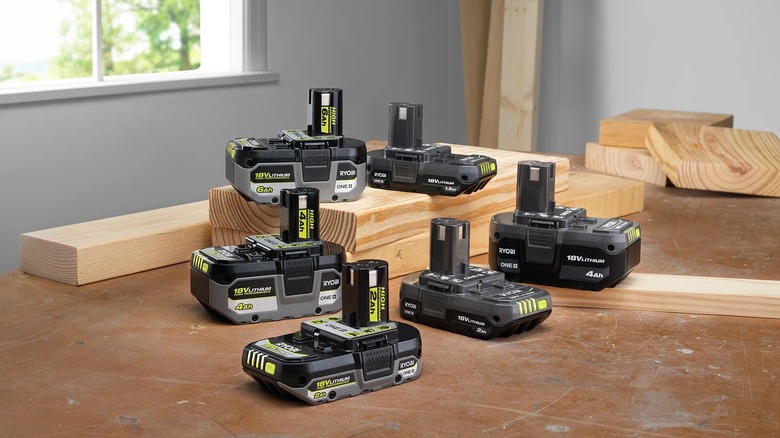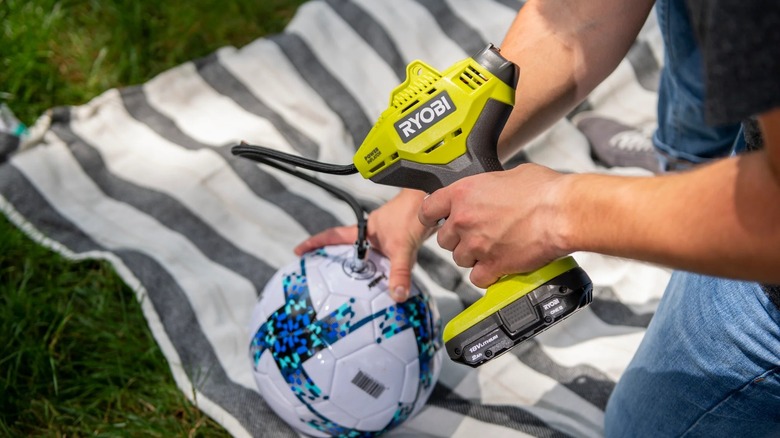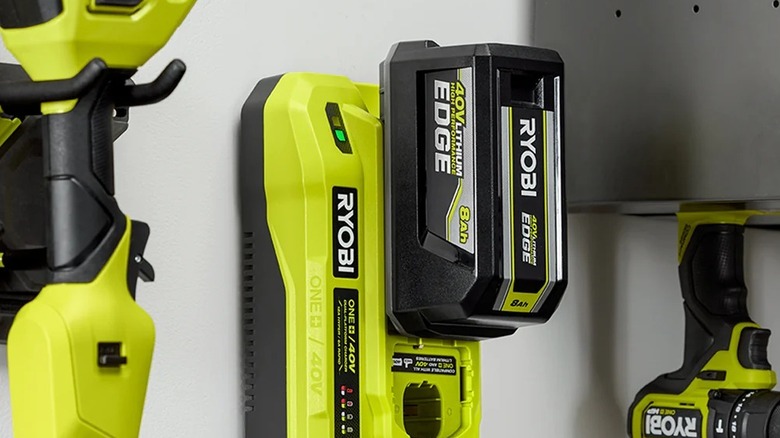What's The Average Lifespan Of A Ryobi Battery, And Are There Ways To Extend It?
Ryobi is many people's go-to brand for household tools. If you're one of those homeowners, then odds are you always stay on top of the maintenance to keep them in good shape. But other than the tools, it's just as important to provide regular upkeep on your Ryobi batteries, too, especially since they don't last a lifetime.
According to Ryobi, the power tool batteries can last up to three years. This closely checks out with the length of Ryobi's warranty for its batteries: three years for the 18V ONE+ and 40V packs, five years for the 80V packs used for households, and two years for the 80V packs used for commercial purposes. After roughly three years, the battery will still work, but you'll already notice a decline in the runtime. What could previously run for a whole day might now last much less. This is only natural, though, and is just the reality with every lithium-ion power tool battery.
But even though your Ryobi battery will eventually end up for disposal, there are some easy practices you can do to extend its lifespan.
Proper use and charging of your Ryobi battery can make it last longer
The way you use and charge your Ryobi battery has a lot to do with how long its service life will be. If you consistently mishandle your pack, don't expect it to last more than its designed lifespan.
One mishandling oversight that's easy to make is choosing the wrong battery capacity for the task. Smaller-capacity batteries like the 1.5Ah or 2Ah aren't fit for jobs that demand more power and take several hours to complete — like trimming thick tree branches or mowing a large overgrown backyard. If you use them for your tool, they will drain immediately, and you'll have to recharge the pack more often just to finish the task.
Every recharge puts the pack through more charge cycles (going from full to empty and back to full). Because lithium-ion batteries have a limited number of charge cycles, you effectively shorten their lifespan. That said, if you often do long and power-hungry jobs, it's best to go with bigger Ryobi batteries like the 9Ah or 12Ah. A higher Ah on your power tool battery delivers a longer runtime and more power, making it more suitable for heavy-duty work.
Besides the battery capacity, you should also be mindful of the ambient temperature when using and charging the pack. Don't charge it in hot garages with temperatures above 80°F (27°C) as heat compromises the battery's structure and causes damage. Ryobi batteries can't tolerate cold temperatures either. So before using them in winter, make sure you leave them sitting at room temperature for a few minutes to warm them up.
There's a right way to store your Ryobi batteries to extend their lifespan
It's tempting to just toss your empty Ryobi batteries in with the rest of your tools after using them. However, there's actually a proper way of storing your batteries to maximize their lifespan. You need to pay attention to two things: the storage location and your battery's charge level.
The storage location needs to be dry, clean, and away from direct sunlight. That means you have to avoid storing your tool batteries in a hot car or garage, especially when you won't use them for months. This is because extreme temperatures and humidity can damage the pack, so as much as possible, pick a location where ambient temperatures stay under 80°F (27°C). It's recommended to take out the battery from the tool or charger before storage, too. Otherwise, you risk draining it faster.
That takes us to the second storage consideration — the battery's charge level. Don't fully drain it before putting it in storage. When lithium-ion power tool batteries are stored empty, the pack still undergoes self-discharge, which is natural for lithium-ion batteries. Unfortunately, this affects the cells and could lead to permanent capacity loss, where the battery can no longer store the same charge level as it could before. Similarly, don't store your Ryobi batteries fully charged. A high voltage in an unused lithium-ion battery is also harmful since it stresses out the cells more than necessary.
To make your Ryobi battery last longer, make sure it's only partially charged. Other power tool manufacturers recommend charging the pack between 40 to 60% before tucking it away.


